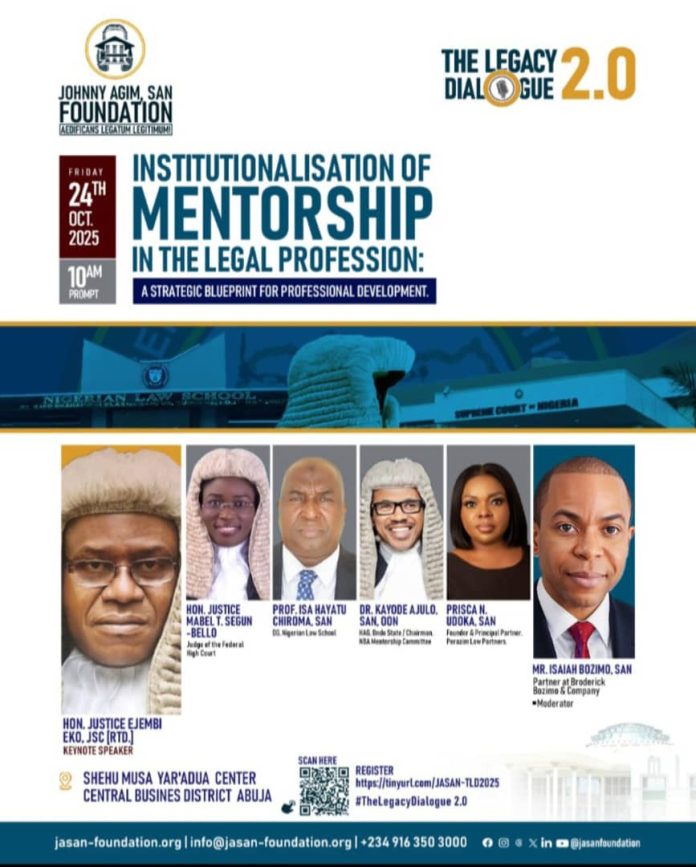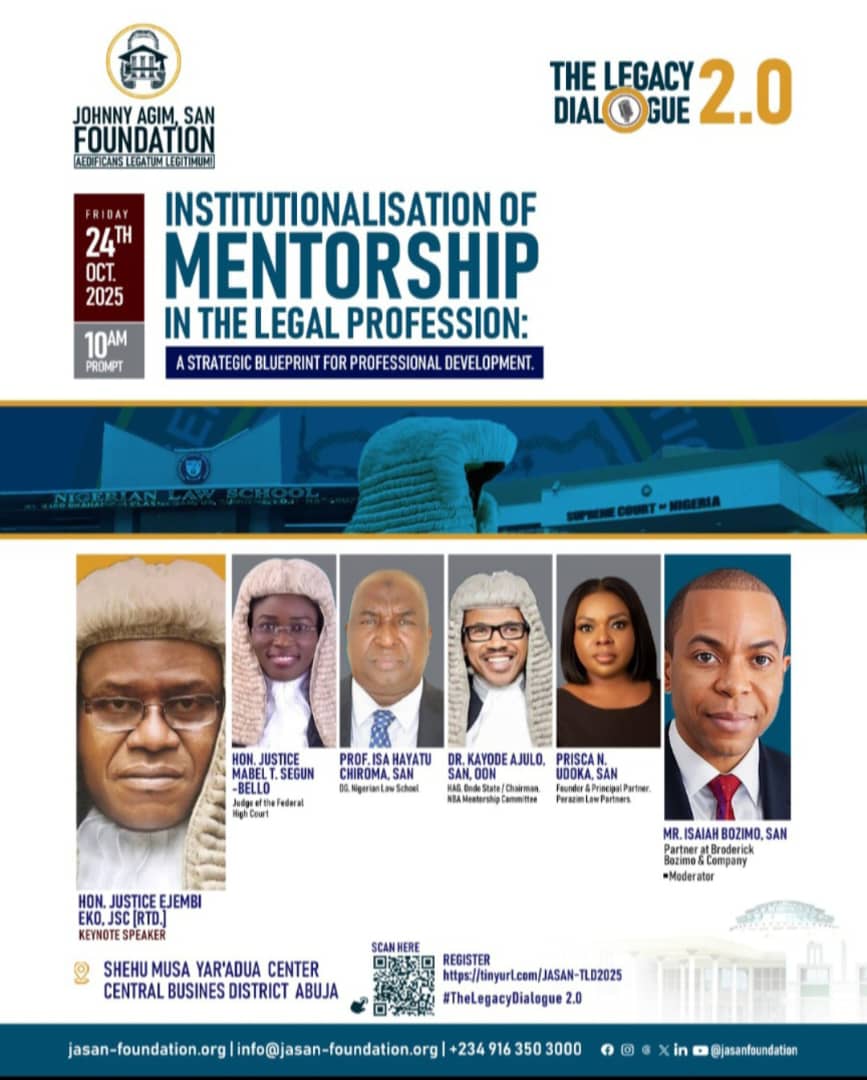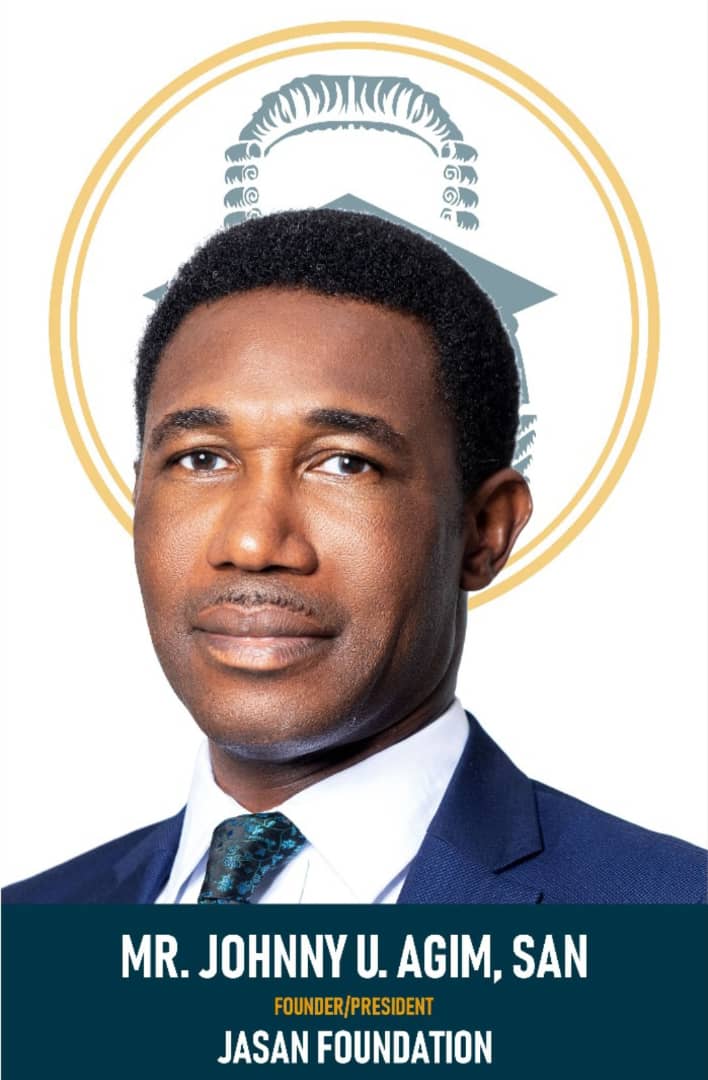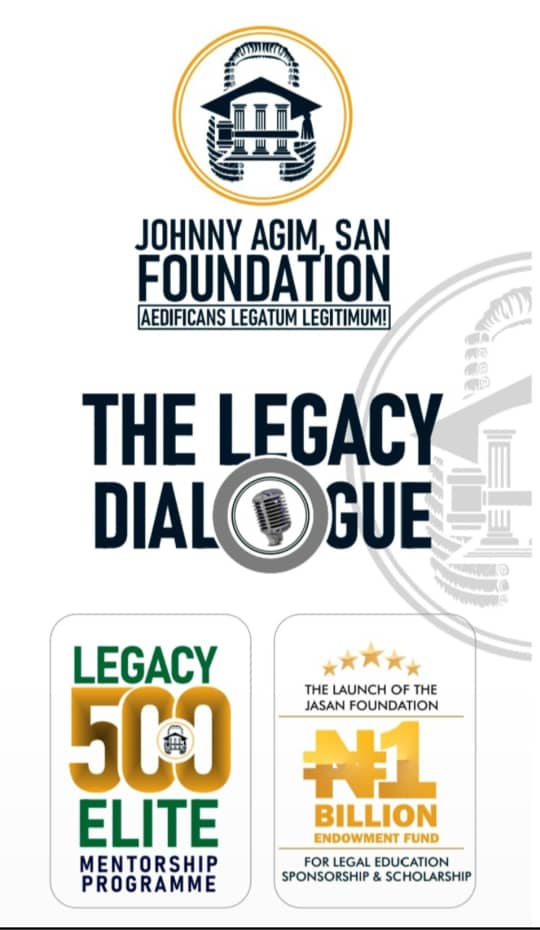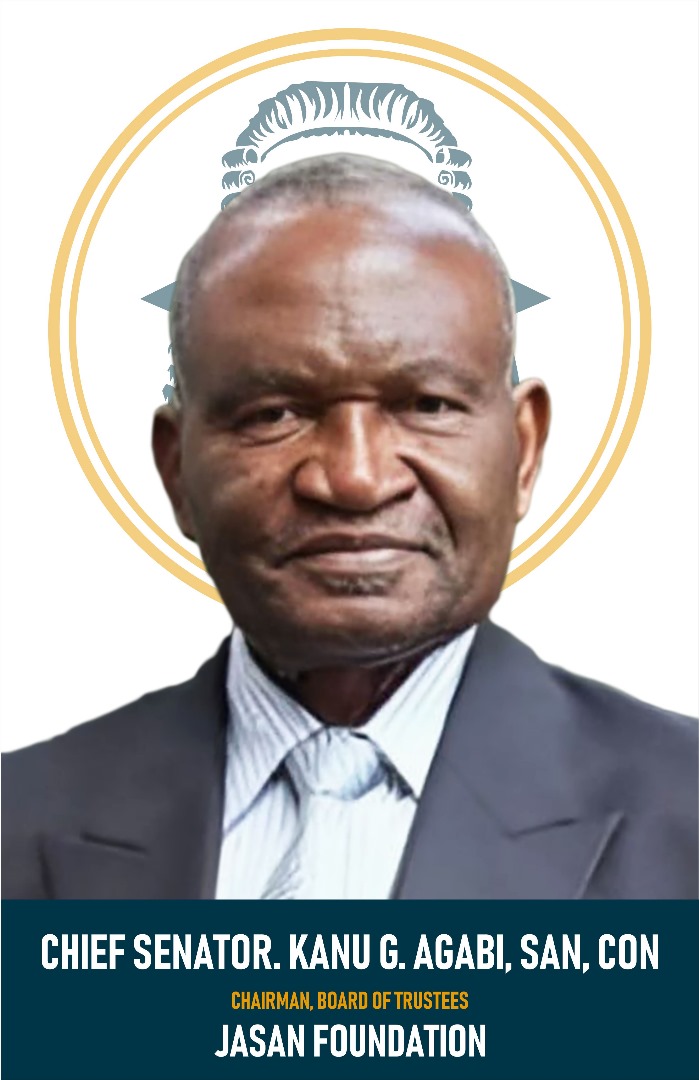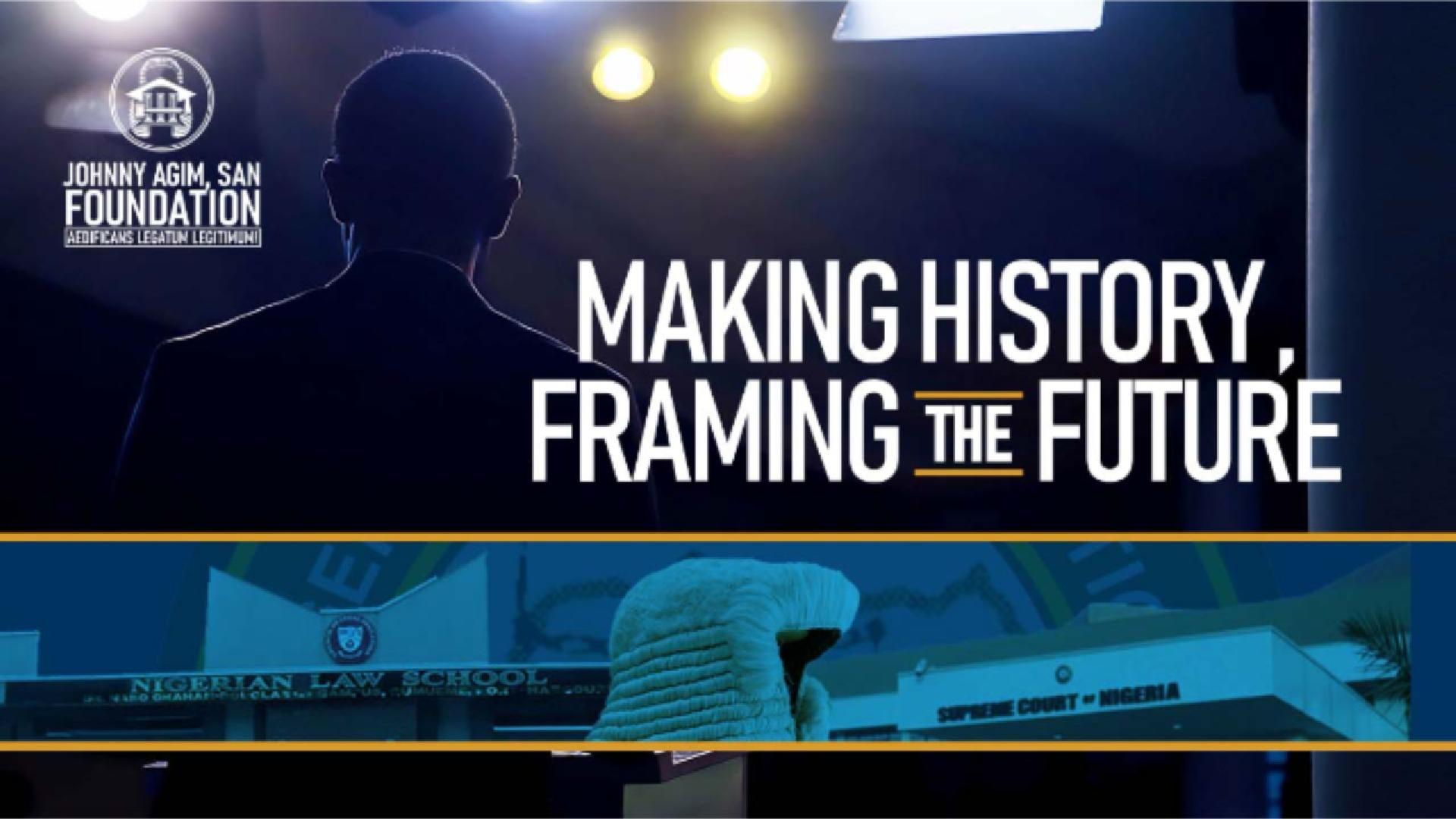INTRODUCTION
The 2nd edition of the Legacy Dialogue, tagged #TheLegacyDialogue2.0, by the Johnny Agim, SAN Foundation [“JASAN Foundation”] with the theme “Institutionalisation of Mentorship in the Legal Profession: A Strategic Blueprint for Professional Development”, was held on the 24th of October 2025, at the Shehu Musa Yar’Adua Centre, Abuja, Federal Capital Territory [FCT], Nigeria.
The event brought together jurists, private and public sector leaders, leaders of the Bar, the Bench, academia, young lawyers, and students alike to address key issues surrounding the development of the legal profession, as well as embedding and institutionalising mentorship as a sustainable pillar of professional development.
In summary, TheLegacyDialogue2.0 convened diverse voices from the Bench, Bar, Academia, and emerging leadership to examine the policies, practices, and cultural shifts required to make mentorship a systemic reality rather than a voluntary initiative.
THE PANEL, PARTICIPANTS & THEMATICS
The programme of event amongst others included, the President’s Address by Mr. Johnny Agim, SAN, the Founder of JASAN Foundation, a Keynote Address by Hon. Mr. Justice Ejembi Eko, JSC [Rtd.] represented by, Hon. Justice Mabel T. Segun-Bello [Judge of Federal High Court] as well as a Panel Discussion which
featured, Hon. Justice Mabel T. Segun-Bello herself, Prof. Isa Hayatu Chiroma, SAN [Director-General, Nigerian Law School] represented by Dr. Esa Onoja [Deputy Director, Academics – Nigerian Law School, Bwari-Abuja Campus], Dr. Kayode Ajulo, OON, SAN, FCIArb [UK], Attorney-General, Ondo State, who is the Chairman, NBA Mentorship Committee; and Mrs. Prisca N. Udoka, SAN Founder/Principal Partner, Perazim Law Partners. The Panel was adroitly moderated by Mr. Isaiah Bozimo, SAN, CIArb., [Partner, Broderick Bozimo & Company].
The thematics of the Dialogue included the following:
a) Policy and Framework Design: Establishing clear mentorship policies adaptable across legal institutions and jurisdictions.
b) Mentor Development and Accreditation: Preparing senior professionals with the pedagogical and ethical skills required for effective guidance.
c) Structured Matching and Performance Evaluation: Implementing data-driven systems to pair mentors and mentees and to assess developmental outcomes.
d) Integration with Continuing Legal Education (CLE): Aligning mentorship milestones with professional certification and career advancement pathways.
e) Technology and Institutional Support: Deploying digital platforms and institutional oversight to ensure accountability and scalability.
The Panel and participants underscored the critical point that mentorship must transcend voluntarism to become a deliberate institutional function, central to the professional development agenda of the NBA, tertiary institutions, the Nigerian Law School, and law firms. Emphasising that institutionalising mentorship
will not only enhance competence and ethics but will also cultivate leadership, inclusivity, and innovation across the legal sector. It explored how structured mentorship can be institutionalised within the legal profession as a deliberate strategy for sustainable professional growth, ethical excellence, and
intergenerational continuity.
OBSERVATIONS
#TheLegacyDialogue 2.0 observed the following:
3.1 The growing concern, as expressed by the Chief Justice of Nigeria [CJN] and senior members of the Bar, over the declining ethical and professional standards within the legal profession, as well as the fact that structured, institutionalised mentorship is a practical and sustainable response to these challenges.
3.2 Mentorship is fundamental to sustaining excellence and integrity in the legal profession. Yet, mentorship remains informal, inconsistent, and dependent on personal relationships rather than institutional commitment. This policy brief proposes a structured, institutionalised mentorship model that embeds professional guidance into the legal ecosystem as a mandatory and measurable element of career development.
3.3 Mentorship is very essential in the legal profession as the mentee is shown a clearer pathway towards fulfilling his ambition, such as the necessary pitfalls to avoid and invaluable advice given to him by his mentor who, by virtue of experience, is better grounded and equipped than himself – in the knowledge,
practice, art, and business of the law. This mentoring also helps to instill the much-needed values in the legal profession, thereby preserving the tradition of the legal profession.
3.4 That structured mentorship is critical for professional growth, ethical grounding, and succession planning.
3.5 That the Bench, Bar, the Academia, and Law Firm Founders each play a unique role in institutionalising mentorship.
3.6 That the Nigerian Bar Association [NBA], the Body of Benchers [BoB] and the Council of Legal Education [CLE]/Nigerian Law School [NLS] must drive sustainable mentorship frameworks.
3.7 That young legal practitioners need accessible, transparent, and practical mentorship channels and platforms like the JASAN Foundation #Legacy500 Elite Mentorship Programme.
4. KEY RESOLUTIONS & RECOMMENDATIONS
4.1. Commitment to Mentorship: – JASAN Foundation reaffirms its commitment to strategically and deliberately promote and enhance mentorship within the legal profession through its Mentorship, Sponsorship, Reforms & Advocacy Blueprint [MSRA Blueprint] and the #Legacy500 Elite Mentorship Programme/Platform, a first of its kind in Nigeria to connect young lawyers to mentors in order to foster professional career development; and excellence among young lawyers.
4.2 Institutional Framework: A formal mentorship structure should be embedded within the Nigerian Bar Association [NBA], its Sections and Fora. That the NBA Secretariat and Mentorship Committee finalise and publish an NBA Mentorship Charter with clear branch-level reporting and evaluation standards.
4.3 Judicial Support: Judges and senior members of the Bench should continue to integrate enhanced and structured mentorship into judicial activities and training programmes.
4.4 Law School Integration: The Body of Benchers [BoB] and Council of Legal Education [CLE] should incorporate mentorship schemes into the academic framework of the Nigerian Law School [NLS]. That the Council of Legal Education and the Nigerian Law School embed a Mentorship Pipeline Programme pairing each Bar Part II student with an approved practitioner and branch mentor prior
to Call-to-Bar, with the relationship continuing for at least twelve months afterwards. The activities around this scheme could be verified through the JASAN Foundation #Legacy500 Elite Mentorship Digital Platform and credited under the NBA ICLE with allocated Credit points. Pilot cohorts can
commence by June 2026.
4.5 Inclusivity & Access: Mentorship opportunities should be inclusive, with deliberate consideration for young lawyers, women, and underrepresented groups.
4.6 Law Firms/Founders Support: That law firms and founders adopt a Model Firm Mentorship Policy integrated with the JASAN Foundation #Legacy500 Elite Mentorship Programme and Digital Platform workflow.
4.7 Technology-Driven Platforms: Virtual and digital platforms should be developed to facilitate wider mentorship access and participation. JASAN Foundation is committed to filling this gap by deploying the JASAN Foundation #Legacy500 Elite Mentorship Programme Digital Platform.
4.8 Monitoring & Evaluation: A system of accountability should be put in place to ensure mentorship programmes are impactful, measurable, safe, and secure. JASAN Foundation is committed to filling this gap by deploying the JASAN Foundation #Legacy500 Elite Mentorship Programme Digital Platform through strategic collaborations.
4.9 Oversight: That a National Mentorship Oversight Committee be established by the relevant stakeholders to guarantee equity and access and to monitor progress through a systemic and seasonal parity dashboard. That the Body of Benchers [BoB], working with the NBA, and Heads of Courts, develop a Bench–Bar Mentorship Cooperation & Strategic Framework to strengthen ethical and procedural standards. The Strategic Framework should define the safe scope of judicial participation in mentorship (ethics, decorum and procedure only); preserve judicial independence; and provide for anonymised scheduled feedback to branches through the NBA. Pilot sessions could be convened within three judicial divisions by Q2/Q3 2026. JASAN Foundation is committed to filling this gap by deploying its strategic team as well as the JASAN Foundation #Legacy500 Elite
Mentorship Programme Digital Platform through strategic collaborations.
CONCLUSION
The Legacy Dialogue 2.0 highlighted the critical role of strategic institutionalised mentorship in shaping a resilient and successful legal profession. By implementing these resolutions, we can ensure a robust future for young lawyers equipped with the necessary skills and insights to thrive in an ever-changing legal environment and becoming institutions of their own. #TheLegacyDialogue2.0 also reaffirmed that mentorship is essential for building a legacy-driven legal profession in Nigeria. It called on all stakeholders—Bar, Bench, Academia, and practitioners—to collaborate in institutionalising mentorship as a sustainable professional development model.
In view of the foregoing, JASAN Foundation therefore calls on the judiciary, the academia, legal professionals and all stakeholders in the legal profession, especially senior lawyers, as well as the legacy and established law firms to make a commitment to and collectively promote excellence through structured and institutionalised mentorship; while young lawyers are called upon to actively seek out mentors to guide their career development.
The Nigerian Bar Association [NBA] is also urged to take deliberate steps to collaborate with the JASAN Foundation and other stakeholders to promote and execute structured mentorship programmes for ongoing professional development to ensure holistic development for young lawyers, and drive positive
change in the legal profession. JASAN Foundation therefore invites the Bench, the Bar, the Council of Legal Education, and law-firm leaders to consider these recommendations for implementation within their respective mandates before
the close of 2026.
This is #TheLegacyDialogue 2.0
JASAN Foundation – Making History … Framing the Future!
Thank you.
Mr. Johnny Agim, SAN ,PRESIDENT
Sen. Kanu G. Agabi, SAN, CONCHAIRMAN, BOARD OF TRUSTEES
Download Communique here:
-Advertisement-
Grab our latest Magazine, "Chief Wole Olanipekun, CFR, SAN, A man of wide horizons and deep intentions". Get your order fast and stress free.
For more details about Newswire Law&Events Magazine, kindly reach out to us on 08039218044, 09070309355. Email: newswiremagazine@yahoo.co.uk. You will be glad you did
Download E-Magazine

